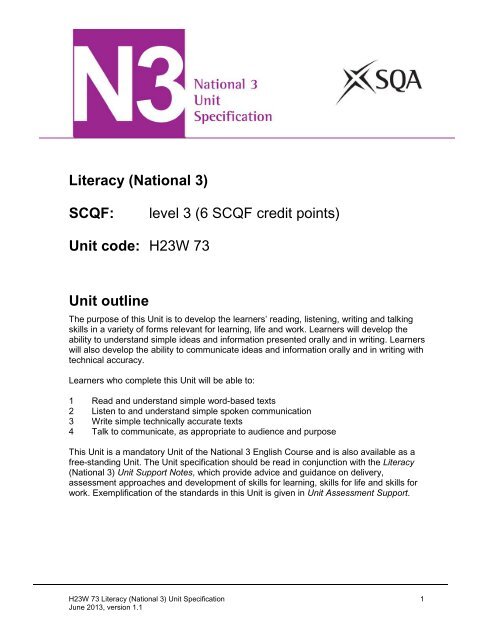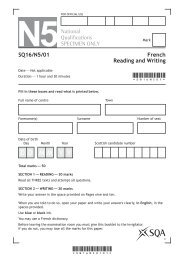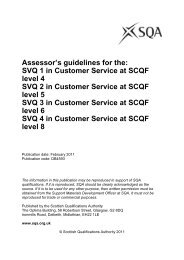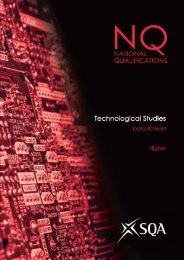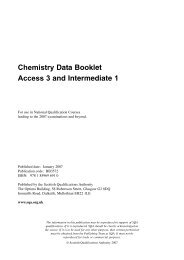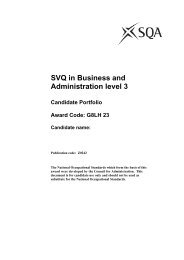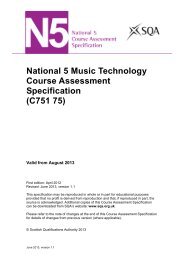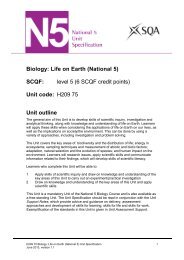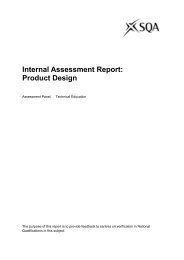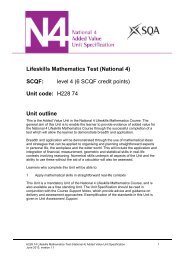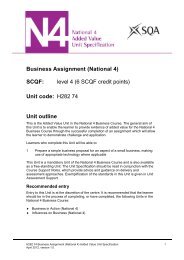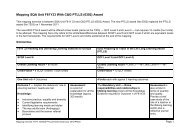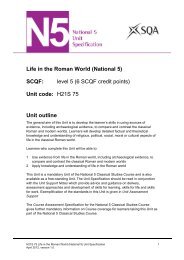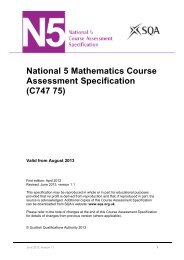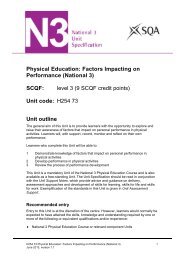Literacy (National 3) SCQF: level 3 (6 SCQF credit points) Unit ... - SQA
Literacy (National 3) SCQF: level 3 (6 SCQF credit points) Unit ... - SQA
Literacy (National 3) SCQF: level 3 (6 SCQF credit points) Unit ... - SQA
You also want an ePaper? Increase the reach of your titles
YUMPU automatically turns print PDFs into web optimized ePapers that Google loves.
<strong>Literacy</strong> (<strong>National</strong> 3)<br />
<strong>SCQF</strong>:<br />
<strong>level</strong> 3 (6 <strong>SCQF</strong> <strong>credit</strong> <strong>points</strong>)<br />
<strong>Unit</strong> code: H23W 73<br />
<strong>Unit</strong> outline<br />
The purpose of this <strong>Unit</strong> is to develop the learners’ reading, listening, writing and talking<br />
skills in a variety of forms relevant for learning, life and work. Learners will develop the<br />
ability to understand simple ideas and information presented orally and in writing. Learners<br />
will also develop the ability to communicate ideas and information orally and in writing with<br />
technical accuracy.<br />
Learners who complete this <strong>Unit</strong> will be able to:<br />
1 Read and understand simple word-based texts<br />
2 Listen to and understand simple spoken communication<br />
3 Write simple technically accurate texts<br />
4 Talk to communicate, as appropriate to audience and purpose<br />
This <strong>Unit</strong> is a mandatory <strong>Unit</strong> of the <strong>National</strong> 3 English Course and is also available as a<br />
free-standing <strong>Unit</strong>. The <strong>Unit</strong> specification should be read in conjunction with the <strong>Literacy</strong><br />
(<strong>National</strong> 3) <strong>Unit</strong> Support Notes, which provide advice and guidance on delivery,<br />
assessment approaches and development of skills for learning, skills for life and skills for<br />
work. Exemplification of the standards in this <strong>Unit</strong> is given in <strong>Unit</strong> Assessment Support.<br />
H23W 73 <strong>Literacy</strong> (<strong>National</strong> 3) <strong>Unit</strong> Specification 1<br />
June 2013, version 1.1
Recommended entry<br />
Entry to this <strong>Unit</strong> is at the discretion of the centre. However, learners would normally be<br />
expected to have attained the skills, knowledge and understanding required by one or<br />
more of the following or equivalent experience.<br />
♦ Core Skills: Communication (<strong>SCQF</strong> <strong>level</strong> 2)<br />
♦ <strong>National</strong> 2 English and Communication or relevant component <strong>Unit</strong>s<br />
Core Skills<br />
Achievement of this <strong>Unit</strong> gives automatic certification of the following:<br />
Complete Core Skills for the <strong>Unit</strong> Communication at <strong>SCQF</strong> <strong>level</strong> 3<br />
Equality and inclusion<br />
This <strong>Unit</strong> specification has been designed to ensure that there are no unnecessary barriers<br />
to learning or assessment. The individual needs of learners should be taken into account<br />
when planning learning experiences, selecting assessment methods or considering<br />
alternative evidence. For further information, please refer to the <strong>Unit</strong> Support Notes.<br />
H23W 73 <strong>Literacy</strong> (<strong>National</strong> 3) <strong>Unit</strong> Specification 2<br />
June 2013, version 1.1
Standards<br />
Outcomes and assessment standards<br />
Outcome 1<br />
The learner will:<br />
1 Read and understand simple word-based texts by:<br />
1.1 Selecting and using relevant information<br />
1.2 Identifying audience and purpose<br />
1.3 Showing awareness of effectiveness<br />
Outcome 2<br />
The learner will:<br />
2 Listen to and understand simple spoken communication by:<br />
2.1 Selecting and using relevant information<br />
2.2 Identifying audience and purpose<br />
2.3 Showing awareness of effectiveness<br />
Outcome 3<br />
The learner will:<br />
3 Write simple technically accurate texts by:<br />
3.1 Selecting and using appropriate language<br />
3.2 Organising writing appropriately<br />
3.3 Using appropriate spelling, punctuation and grammar<br />
Outcome 4<br />
The learner will:<br />
4 Talk to communicate, as appropriate to audience and purpose, by:<br />
4.1 Selecting and using simple language<br />
4.2 Organising spoken communication<br />
4.3 Using some non-verbal conventions<br />
H23W 73 <strong>Literacy</strong> (<strong>National</strong> 3) <strong>Unit</strong> Specification 3<br />
June 2013, version 1.1
Evidence Requirements for the <strong>Unit</strong><br />
Assessors should use their professional judgement, subject knowledge and experience,<br />
and understanding of their learners, to determine the most appropriate ways to generate<br />
evidence and the conditions and contexts in which they are used. They should ensure that<br />
there is sufficient evidence of competence in the learner’s evidence of literacy skills to<br />
allow a judgement to be made that the learner has achieved the <strong>Unit</strong>.<br />
Evidence for this <strong>Unit</strong> will include:<br />
For Outcome 1: responses to reading at least one word-based text.<br />
For Outcome 2: responses to listening on at least one occasion.<br />
For Outcome 3: at least one word-based text of more than 80 words which communicates<br />
meaning on first reading.<br />
For Outcome 4: talking, individually or as part of a group discussion, on at least one<br />
occasion.<br />
Word-based texts are likely to be functional or transactional in nature.<br />
Where the <strong>Literacy</strong> (<strong>National</strong> 3) <strong>Unit</strong> is delivered as part of the <strong>National</strong> 3 English Course,<br />
further advice and guidance on integrated assessment is provided in the <strong>National</strong> 3<br />
English Course Support Notes.<br />
Exemplification of assessment is provided in <strong>Unit</strong> Assessment Support. Advice and<br />
guidance on possible approaches to assessment is provided in the <strong>Unit</strong> Support Notes.<br />
H23W 73 <strong>Literacy</strong> (<strong>National</strong> 3) <strong>Unit</strong> Specification 4<br />
June 2013, version 1.1
Development of skills for learning, skills for life and skills<br />
for work<br />
The <strong>SQA</strong> Skills Framework: Skills for Learning, Skills for Life and for Work contains<br />
generic literacy skills. The <strong>Literacy</strong> (<strong>National</strong> 3) <strong>Unit</strong> is derived from this framework and<br />
learners will cover all the main literacy skills. The main literacy skills are as follows:<br />
1 <strong>Literacy</strong><br />
1.1 Reading<br />
1.2 Writing<br />
1.3 Listening and talking<br />
It is expected that learners will develop broad, generic skills through this <strong>Unit</strong>. The skills<br />
that learners will be expected to improve on and develop through the <strong>Unit</strong> are based on<br />
<strong>SQA</strong>’s Skills Framework: Skills for Learning, Skills for Life and Skills for Work and drawn<br />
from the main skills areas listed below. These must be built into the <strong>Unit</strong> where there are<br />
appropriate opportunities.<br />
5 Thinking skills<br />
5.3 Applying<br />
5.4 Analysing and evaluating<br />
Amplification of these is given in <strong>SQA</strong>’s Skills Framework: Skills for Learning, Skills for Life<br />
and Skills for Work. The <strong>level</strong> of these skills should be at the same <strong>SCQF</strong> <strong>level</strong> of the <strong>Unit</strong><br />
and be consistent with the <strong>SCQF</strong> <strong>level</strong> descriptor. Further information on building in skills<br />
for learning, skills for life and skills for work is given in the <strong>Unit</strong> Support Notes.<br />
<strong>Literacy</strong> skills shown in this <strong>National</strong> <strong>Unit</strong> provide automatic certification of Core Skill:<br />
Communication at <strong>SCQF</strong> <strong>level</strong> 3.<br />
H23W 73 <strong>Literacy</strong> (<strong>National</strong> 3) <strong>Unit</strong> Specification 5<br />
June 2013, version 1.1
Administrative information<br />
Published: June 2013 (version 1.1)<br />
Superclass:<br />
KB<br />
History of changes to <strong>National</strong> <strong>Unit</strong> Specification<br />
Version Description of change Authorised by Date<br />
1.1 Core skill clarification Qualification<br />
Development<br />
Manager<br />
June 2013<br />
This specification may be reproduced in whole or in part for educational purposes provided<br />
that no profit is derived from reproduction and that, if reproduced in part, the source is<br />
acknowledged. Additional copies of this <strong>Unit</strong> can be downloaded from <strong>SQA</strong>’s website at<br />
www.sqa.org.uk.<br />
Note: readers are advised to check <strong>SQA</strong>’s website: www.sqa.org.uk to ensure they are<br />
using the most up-to-date version of the <strong>Unit</strong> Specification.<br />
© Scottish Qualifications Authority 2013<br />
H23W 73 <strong>Literacy</strong> (<strong>National</strong> 3) <strong>Unit</strong> Specification 6<br />
June 2013, version 1.1


